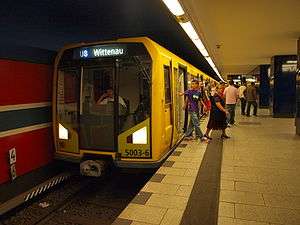BVG Class H
Class H refers to a type of electric multiple unit train, used by the Berlin U-Bahn, the Berlin underground railway system. They are the most modern wide profile trains in the cities network and have been available since 1995. It is the first model to allow passengers to freely walk through the entire length of the train, as opposed to having multiple closed off compartments.
| BVG Class H | |
|---|---|
 A H-type train at tube station Osloer Straße | |
| In service | 1995-present |
| Manufacturer | Adtranz, ABB Henschel, Bombardier Inc. |
| Built at | Hennigsdorf |
| Constructed | 1994-2002 |
| Entered service | 1995 |
| Number built | 46 trains |
| Formation | 6 per train set DT–M1–M2–M2–M1–DT |
| Fleet numbers | 5001 - 5046 |
| Capacity | 296 seated; 1,624 standing; 2 PIW spaces |
| Operator(s) | Berliner Verkehrsbetriebe |
| Line(s) served | U5, U6, U7, U8 & U9 |
| Specifications | |
| Car body construction | Aluminium-alloy double-skinned construction |
| Car length | 0.09874 m |
| Width | 2.650 mm |
| Height | 0.0180 m |
| Floor height | 950 mm |
| Doors | 0.0180 m, 8 per car |
| Maximum speed | 80 km/h (50 mph) |
| Weight | 226.8t /335.9 t (laden) |
| Power output | 2.24 MW (3,000 hp) |
| Transmission | WN Drive |
| Acceleration | 1.0 m/s2 |
| Deceleration | 1.2 m/s2 (service) 1.3 m/s2 (emergency) |
| Auxiliaries | IGBT–VVVF Auxiliary Inverter with Battery Charger 80 kVA–16 kW |
| Power supply | 750 V DC |
| Electric system(s) | 750 V DC |
| Current collection method | Third rail |
| Braking system(s) | Regenerative Braking, Resistor Braking, Air Brakes |
| Track gauge | 1,435 mm (4 ft 8 1⁄2 in) standard gauge |
After the Reunification of Germany, the BVG saw an urgent need for more trains, as well as a new, more uniform model for both the East and the West to use. So in order to replace the D, DL and E Classes, the Berlin Transport Company (BVG) placed an order of 115 new trains in 1992, which was later reduced to 26, with 20 more to be delivered at a later time. The first test runs of the new trains were held from 1995 before serial delivery began in 1997. There are currently no plans to manufacture any more H class trains.
Unlike other wide profile trains, the H Class trains only feature longitudinal seats, a feature usually found in small profile trains. It was also the first model introduced in Berlin to feature a tube-like makeup, allowing for free movement through the whole length of the train. Their interior was mainly white and yellow.
Each of the batches of H Class trains delivered received its own name, with the prototypes being referred to as H95 and the versions of the two later, serial deliveries as H97 and H01 respectively. All individual trains also received a serial number in the format of 5xxx. They were ordered from and manufactured by Adtranz, ABB Henschel and Bombardier.